Table of Contents
13 nachhaltige Modemarken – PFAS-frei, bio & fair
This page may contain affiliate links. We may earn a commission on purchases, at no additional cost to you. Learn more →
Hast du dir schon einmal Gedanken darüber gemacht, was in der Kleidung steckt, die du jeden Tag trägst? Früher habe ich meine Klamotten nur danach ausgesucht, wie bequem und stylisch sie waren - bis ich herausfand, dass die Modeindustrie über 8.000 schädliche Chemikalien während der Produktion verwendet.
Falls du an einem gesünderen Lebensstil arbeitest, könnte die Kleidung, die du trägst, all deine harte Arbeit zunichte machen. Deine Haut ist das größte Organ deines Körpers und sie nimmt alles auf, womit du sie in Kontakt bringst - einschließlich aller aggressiven Chemikalien in deinen Kleidungsstücken. Viele dieser Giftstoffe, wie PFAS, können das Risiko für Hormonschäden und sogar Krebs erhöhen!
Die gute Nachricht ist: Es ist möglich, sich clean zu kleiden, ohne auf Style oder Komfort zu verzichten. In diesem Artikel findest du meine handverlesenen Favoriten der besten nachhaltigen Fashion-Marken. Außerdem erfährst du alles über wirklich chemiefreie Materialien, denen du vertrauen kannst, wie du giftige Kleidung erkennst und welche Gesundheitsrisiken herkömmliche Mode birgt.
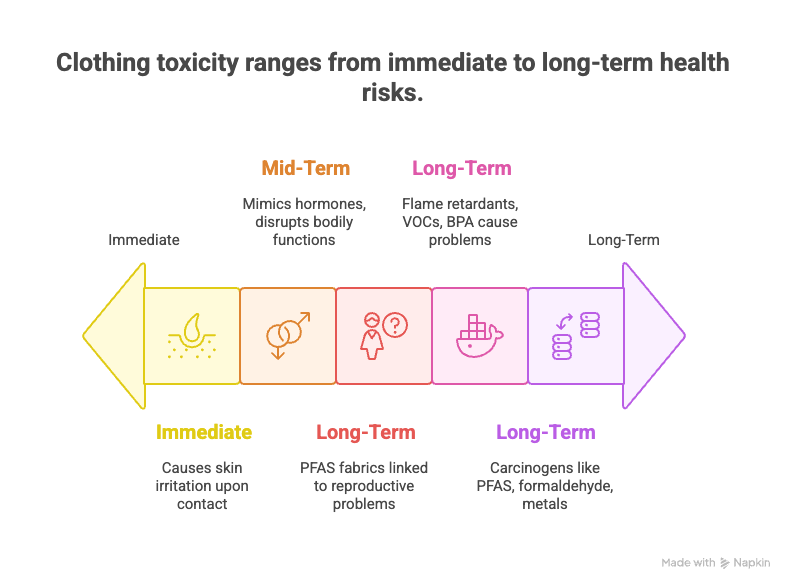
Warum auf nachhaltige Fair Trade Kleidung umsteigen?
Es ist erschreckend zu erkennen, dass unsere Lieblings-Outfits unseren Körper mit giftigen Substanzen belasten könnten. Viele Fast-Fashion und herkömmliche Modemarken behandeln Kleidungsstücke mit aggressiven Chemikalien, um Falten zu verhindern, leuchtende Farben zu erzielen, Feuchtigkeit abzuleiten und sie sogar flammfest zu machen.
Nimm zum Beispiel Shein. Eine Untersuchung aus 2024 ergab, dass viele Produkte der Fast-Fashion-Marke erschreckend hohe Mengen an Phthalaten enthalten - bis zu 428 Mal höher als die gesetzlichen Sicherheitsgrenzwerte für bestimmte Artikel! Eine Kleinkind-Jacke enthielt fast 20 Mal mehr Blei als erlaubt, und eine Handtasche überstieg den Sicherheitsgrenzwert um das Fünffache.
Schauen wir uns an, wie sich diese Chemikalien auf deine Gesundheit auswirken können:
Unmittelbare Gesundheitsrisiken
-
Textildermatitis: Synthetische Stoffe und Veredelungschemikalien (wie Formaldehyd-Harze oder bestimmte Farbstoffe) können zu Textildermatitis führen und Rötungen, Schuppungen oder Juckreiz auslösen. Diese Symptome können bereits wenige Stunden oder sogar Tage nach dem Kontakt auftreten.
Langfristige Gesundheitsrisiken
Leider sind unmittelbare Hautreaktionen nur die Spitze des Eisbergs. Wie du dir vorstellen kannst, entstehen die größten Gesundheitsrisiken durch die langfristige Aufnahme über die Haut. Das zeigen aktuelle Studien:
-
Hormonelle Störungen: Einige Chemikalien, darunter Phthalate, sind bekannte Hormonstörer. Das bedeutet, sie können deine Hormone nachahmen und verschiedene Körperfunktionen beeinträchtigen.
-
Fruchtbarkeitsprobleme: Mit PFAS behandelte Stoffe können Unfruchtbarkeit verursachen und das Risiko für Fortpflanzungsprobleme wie Endometriose und polyzystische Ovarialerkrankung erhöhen.
-
Entwicklungsstörungen: Flammschutzmittel, VOCs und BPA - Chemikalien, die häufig in Kleidung vorkommen - können Entwicklungsprobleme verursachen.
-
Krebs: Der Chemikalien-Cocktail in Kleidung enthält mehrere bekannte Krebserreger, darunter PFAS, Formaldehyd und Schwermetalle.
Falls du Kinder hast, solltest du jetzt hellhörig werden. Die Umweltchemikerin Miriam Diamond erklärt, dass Kinderhaut diese Chemikalien leichter aufnimmt als Erwachsenenhaut - wodurch sie anfälliger für die negativen Gesundheitsauswirkungen sind. Und denk daran: Kleinkinder kauen oft auf Kleidung herum, was einen weiteren Aufnahmeweg schafft!
Die gute Nachricht? Du musst keine Klamotten mit Schadstoffen tragen. Nachhaltige Modemarken verwenden üblicherweise natürliche Materialien und sicherere Verfahren, um diese Giftstoffe aus der Garderobe deiner Familie fernzuhalten (achte allerdings immer auf die entsprechenden Siegel) .
Die besten nachhaltigen Modemarken
Armedangels | Hier kaufen*
Organic Basics | Hier kaufen*
Living Crafts | Hier kaufen*
Jan & June | Hier kaufen*
LANIUS | Hier kaufen*
Jungmaven | Hier kaufen*
Outerknown | Hier kaufen*
erlich Textil | Hier kaufen*
The Knotty Ones | Hier kaufen*
Aikyou | Hier kaufen*
AYA | Hier kaufen*
MELA | Hier kaufen*
People Wear Organic | Hier kaufen*
So wählen wir die besten nachhaltige Modemarken aus
Jedes Label, das wir empfehlen, muss drei große Hürden meistern:
|
|
Worauf wir achten |
Warum es wichtig ist |
|---|---|---|
|
Sicherheit für Haut & Planet |
•PFAS-freie, formaldehydfreie Veredelung • Natürliche oder recycelte Fasern (vorzugsweise GOTS Bio-Baumwolle, Leinen, Hanf) • Schonende oder pflanzenbasierte Farbstoffe, verifiziert durch OEKO-TEX 100 oder bluesign® |
Hält hormonschädigende und krebserregende Chemikalien von deinem Körper und aus den Gewässern fern. |
|
Ethische Produktion |
• Fair Trade Produktionsstätten• Transparente Lieferketten |
Gesündere Kleidung sollte nicht auf Kosten der Ausbeutung von Arbeitskräften gehen - ethische Beschaffung schließt diese Lücke. |
|
Alltagstauglichkeit |
Komfort, Langlebigkeit und Style bestätigt durch Tragetests und Kundenbewertungen |
Sichere Stoffe müssen trotzdem gut aussehen, sich gut anfühlen und unzählige Waschgänge überstehen. |
Marken, die alle drei Kriterien erfüllen, schaffen es auf unsere jährliche Liste der "Besten schadstofffreien Kleidung" - damit du deine Garderobe mit völlig gutem Gewissen auffrischen kannst.
Welche sind die besten PFAS-freien nachhaltigen Modemarken?
Hier sind unsere Top-Empfehlungen für Modelabel, die schädliche Chemikalien aus ihren Produkten fernhalten. Diese Marken verwenden Bio oder natürliche Materialien, ungiftige natürliche Farbstoffe und ethische Produktionsmethoden, damit du eine gesündere Garderobe aufbauen kannst, ohne auf Style oder Komfort zu verzichten.
Armedangels* – Unsere Top-Empfehlung für schadstofffreie Basics
Zertifizierungen: GOTS, PETA-Approved Vegan
Umweltfreundliche Materialien: GOTS-zertifizierte Bio-Baumwolle, TENCEL™ Lyocell, recycelte Baumwolle, Leinen
Größenbereich: XS – XXL
Preisbereich: 9.90 € – 279.90 €
Warum ich sie mag: Armedangels ist eine meiner absoluten Lieblingsmarken für nachhaltige, schadstofffreie Kleidung. Das Kölner Label steht für kompromisslose Transparenz, faire Arbeitsbedingungen und eine konsequent ökologische Produktion – ganz ohne PFAS, Pestizide, BPA, Formaldehyd oder andere bedenkliche Chemikalien. Die Basics und Everyday-Essentials sind hochwertig verarbeitet, superbequem und langlebig – so lohnt sich auch der etwas höhere Preis. Besonders praktisch: Armedangels bietet auch eine eigene Kids-Linie mit schadstofffreier Kleidung für Kinder an.
Lieblingsstück: Die „IVAARA“ Sweatpants aus Bio-Baumwolle – so weich und gemütlich, dass man sie am liebsten rund um die Uhr tragen möchte!
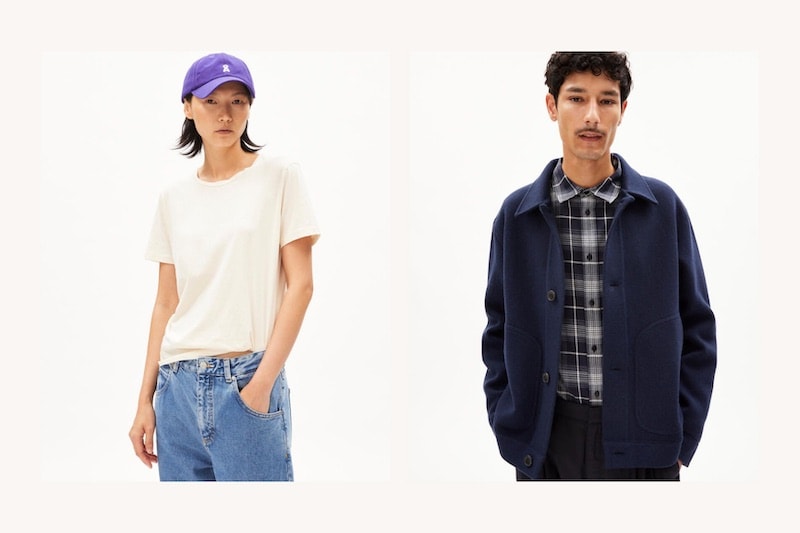
Organic Basics * - Beste Wahl für Alltags-Basics
Zertifizierungen: Global Organic Textile Standard (GOTS), PETA-approved Vegan, Global Recycled Standards (GRS), 1% for the Planet
Umweltfreundliche Materialien: GOTS-zertifizierte Bio-Baumwolle, Tencel™ Lyocell, recyceltes Nylon, recycelte Baumwolle, recycelte Wolle, TENCEL™ Modal, Lenzing Ecovero
Größenbereich: XXS - 3XL
Preisbereich: €9 - €117
Warum ich sie mag: Organic Basics macht es einfach, deine Garderobe Schritt für Schritt zu schadstoffrei zu gestalten. Sie bieten alle Alltags-Basics - von Unterwäsche und Pyjamas bis hin zu T-Shirts und Sportkleidung - ethisch hergestellt mit sicheren Materialien. Du kannst bei klassischen neutralen Tönen bleiben oder dir Farbakzente gönnen, in dem Wissen, dass alles mit schonenden, schadstofffreien Farbstoffen gefärbt ist. Ich schätze auch, dass Organic Basics recycelte Materialien (wie Nylon aus Fischernetzen) neben Bio-Baumwolle verwendet und damit beweist, dass Nachhaltigkeit und Schadstofffreiheit Hand in Hand gehen können.
Lieblingsstück: Der Everyday Turtleneck. Es ist ein leichter Bio-Baumwoll-Rollkragenpullover, der sich perfekt zum Layering im Winter eignet oder im Frühling solo getragen werden kann. Ich liebe, dass er atmungsaktiv und weich ist und seine Form behält - ein echter Ganzjahres-Basic!
Hier bei Organic Basics shoppen*
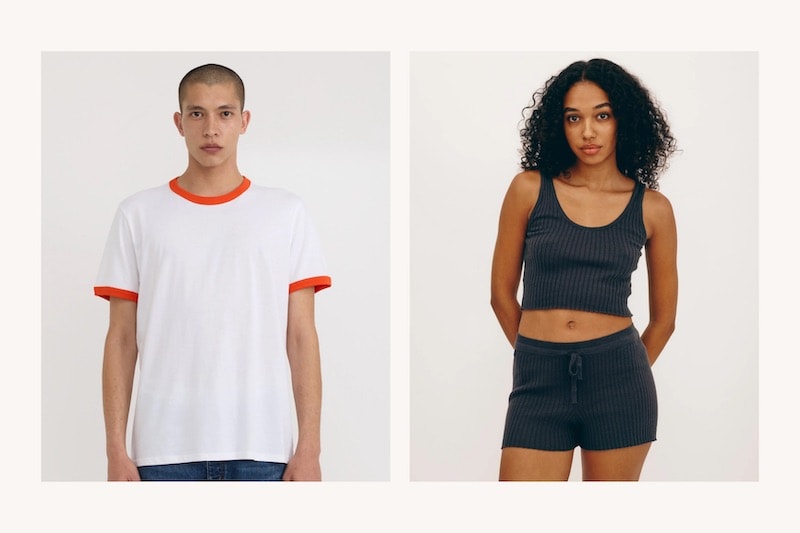
Living Crafts * – Unsere Empfehlung für nachhaltige, preiswerte Basics
Zertifizierungen: GOTS, Fair Wear Foundation
Ungiftige Materialien: 100% GOTS-zertifizierte Bio-Baumwolle, geringe Anteile Elastan bei Bedarf
Größenbereich: XS – XXL
Preisbereich: 2.99 € – 129.99 €
Warum ich sie mag: Living Crafts macht nachhaltige Mode für alle zugänglich – und das schon seit Jahrzehnten! Die Kollektionen aus zertifizierter Bio-Baumwolle sind nicht nur schadstofffrei und besonders angenehm auf der Haut, sondern werden auch unter fairen Bedingungen in Europa gefertigt. Ob bequeme Basics wie T-Shirts, Unterwäsche und Leggings oder gemütliche Nachtwäsche und Socken: Hier findet die ganze Familie ihre Lieblingsstücke. Besonders sympathisch finde ich, dass Living Crafts auf plastikfreie Verpackungen und kurze Lieferwege achtet – so fühlt sich nachhaltiges Einkaufen gleich doppelt gut an.
Lieblingsstück: Der Frottee-Schlafanzug „BONNIE“ aus GOTS-zertifizierter Bio-Baumwolle ist kuschelig warm und dank elastischer Bündchen besonders bequem – perfekt für entspannte Nächte.
Hier bei Living Crafts shoppen*
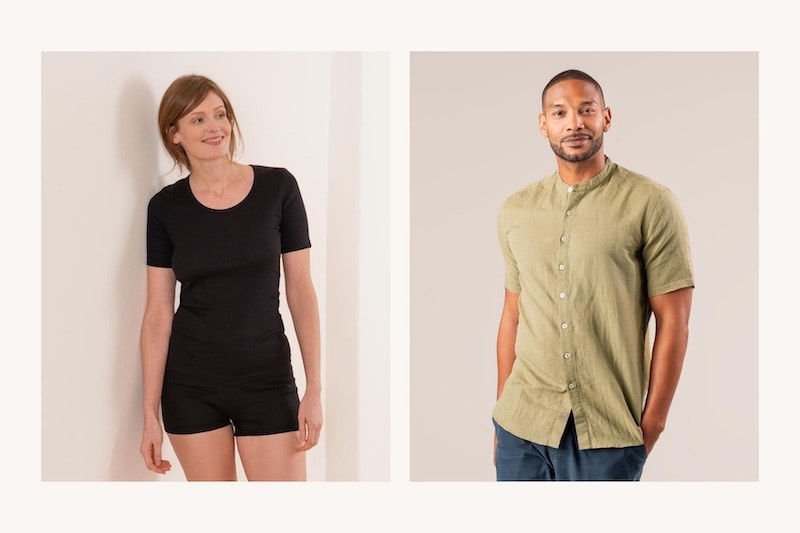
LANIUS * – Unsere Empfehlung für nachhaltige Kleidung mit femininer Note
Zertifizierungen: GOTS, PETA-Approved Vegan
Natürliche Materialien: Bio-Baumwolle, TENCEL™ Lyocell, Leinen, Hanf, recycelte Stoffe
Größenbereich: 34 – 44
Preisbereich: 7.90 € – 499.99 €
Warum ich sie mag: LANIUS vereint feminine Schnitte, hochwertige Naturmaterialien und zeitloses Design auf besonders nachhaltige Weise. Das Kölner Label setzt konsequent auf Bio-Baumwolle, TENCEL™ Lyocell und recycelte Stoffe, die nicht nur gut zur Haut, sondern auch zur Umwelt sind. Die Kleidungsstücke sind angenehm zu tragen, vielseitig kombinierbar und werden unter fairen Bedingungen gefertigt. Mit viel Liebe zum Detail entstehen so stilvolle Lieblingsstücke, die lange Freude machen und einen bewussten Lebensstil unterstützen.
Lieblingsstück: Das luftige Midikleid aus Bio-Baumwolle – weich, elegant und perfekt für warme Tage. Hier trifft femininer Stil auf umweltfreundliche Materialien und faire Produktion.
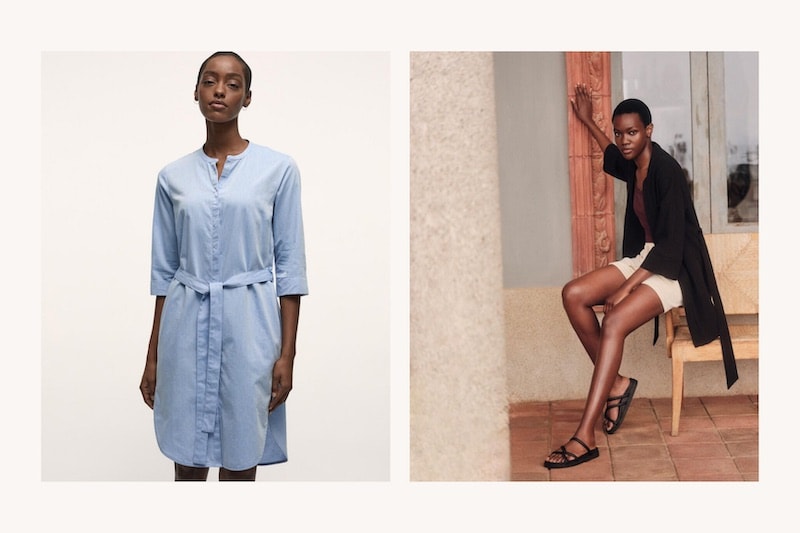
Jungmaven - Beste Wahl für Hanf-Kleidung
Zertifizierungen: Global Organic Textile Standard (GOTS), Organic Content Certified (OCS)
Natürliche Materialien: Hanf, Bio-Baumwolle
Größenbereich: XS - XXL
Preisbereich: 38.95 € - 350.95 €
Warum ich sie mag: Jungmaven setzt seit Jahrzehnten auf Hanf-Stoffe, und das merkt man an ihren entspannten, hochwertigen Basics. Hanf ist ein nachhaltiges Superfaser - es wächst schnell ohne Pestizide und verbessert sogar die Bodengesundheit. Durch die Mischung von Hanf mit Bio-Baumwolle kreiert Jungmaven T-Shirts, Tops und Sweats, die langlebig, atmungsaktiv und völlig schadstofffrei sind. Der Style ist sehr kalifornisch-lässig, mit vintage-inspirierten Farbtönen und entspannten Schnitten. Sie pflanzen auch für jedes verkaufte Produkt Bäume, was ihre "Erde-zuerst"-Philosophie unterstreicht.
Lieblingsstück: Das leichte Hanf-Sweatshirt. Es sieht aus wie ein Retro-Langarmshirt, gibt dir aber genau die richtige Wärme. Ich ziehe es an kühlen Abenden an - es hält mich gemütlich warm, ohne sich jemals schwer oder klobig anzufühlen.
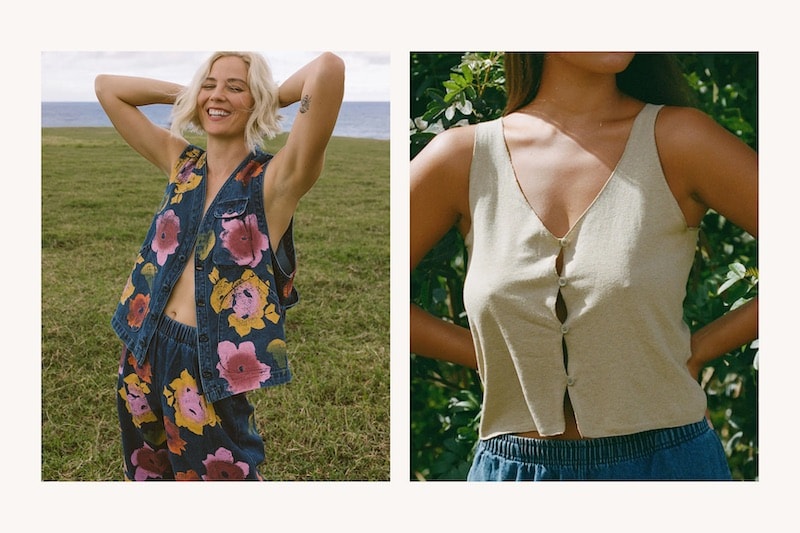
Outerknown - Beste Wahl für Herren
Zertifizierungen: Fair Trade USA, GOTS, Regenerative Organic Certified
Natürliche Materialien: Regenerative Bio-Baumwolle, Hanf, recyceltes Polyester
Größenbereich: XS - 3XL
Preisbereich: 32 € - 315 €
Warum ich sie mag: Outerknown bietet eine der größten Auswahlen an schadstofffreier Herrenmode, ohne bei Style oder Nachhaltigkeit Kompromisse einzugehen. Die von Pro-Surfer Kelly Slater mitgegründete Marke stellt alles her - von lässigen T-Shirts und Jeans bis hin zu Badehosen und Hemden - alles mit umweltfreundlichen Materialien. Viele Stücke verwenden 100% regenerative Bio-Baumwolle (angebaut auf eine Weise, die den Boden regeneriert), andere enthalten Hanf oder recycelte Fasern. Outerknown glänzt auch bei Oberbekleidung und bietet PFC-freie, wasserabweisende Jacken und Schichten für alle Klimazonen. Es ist die erste Wahl für Männer, die schick aussehende, langlebige Kleidung wollen, die nicht mit einer Chemikalien-Ladung daherkommt.
Bestseller: Das legendäre Blanket Shirt. Kunden nennen es oft "das gemütlichste Hemd, das je gemacht wurde", und dem würde ich zustimmen - dieses schwere Bio-Baumwoll-Flanell-Overhemd ist superweich und warm. Es ist ein Investment-Piece, nach dem du ständig greifen wirst.
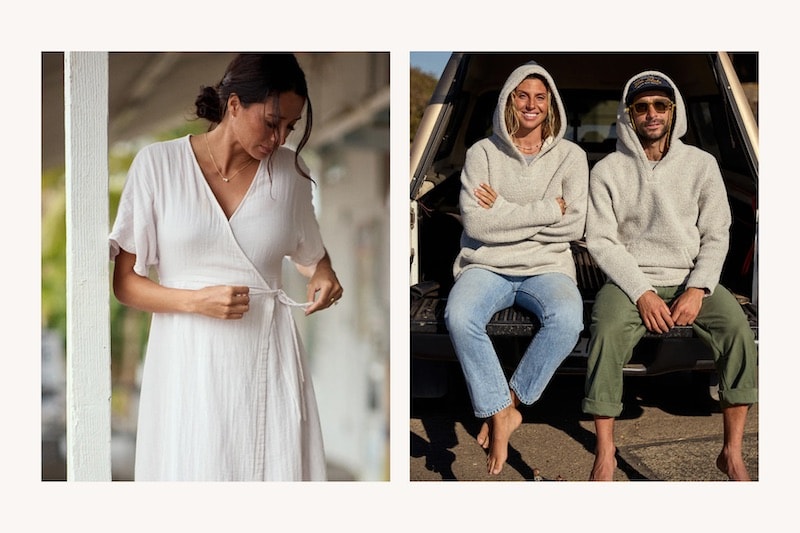
Jan & June* – Unsere Empfehlung für nachhaltige Trend-Pieces
Zertifizierungen: GOTS, Fairtrade
Umweltfreundliche Materialien: 100% GOTS-zertifizierte Bio-Baumwolle, Leinen, TENCEL™ Lyocell
Größenbereich: XXS – 3XL
Preisbereich: ca. 49.90 € – 139.90 €
Warum ich sie mag: Jan & June begeistert mit besonderen, modischen Styles, die Nachhaltigkeit und aktuelle Trends gekonnt verbinden. Das Hamburger Label setzt auf schadstofffreie, umweltfreundliche Materialien wie GOTS-zertifizierte Bio-Baumwolle und TENCEL™ Lyocell. Die Kollektionen sind modern, kreativ und dennoch zeitlos – perfekt für alle, die Wert auf Individualität, Style und eine nachhaltige Garderobe legen. Transparenz, faire Arbeitsbedingungen und kurze Lieferketten sind für Jan & June selbstverständlich.
Lieblingsstück: Das Midi Dress „TRIANGLE“ – ein locker fallendes, schlichtes Kleid aus fließendem Tencel®-Stoff mit Spaghetti-Trägern und V-Ausschnitt.
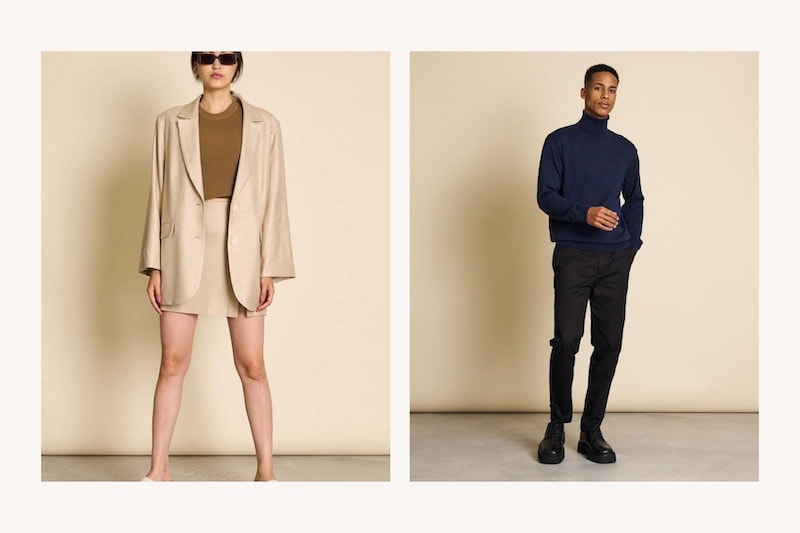
erlich textil* – Unsere Empfehlung für nachhaltige Bio-Unterwäsche
Zertifizierungen: GOTS, OEKO-TEX Standard 100
Umweltfreundliche Materialien: GOTS-zertifizierte Bio-Baumwolle, geringe Anteile Elasthan
Größenbereich: XS – 3XL
Preisbereich: 6.26 € – 204.95 €
Warum ich sie mag: erlich textil zeigt, dass Unterwäsche nicht nur bequem und schön, sondern auch nachhaltig und schadstofffrei sein kann. Die Modelle bestehen aus superweicher Bio-Baumwolle und werden fair in Europa produziert. Die Schnitte sind zeitlos, die Farben vielseitig und das Tragegefühl besonders angenehm auf der Haut – ganz ohne störende Etiketten oder kratzende Nähte. erlich textil legt großen Wert auf Transparenz, faire Arbeitsbedingungen und plastikfreie Verpackung. Wer Wert auf Komfort, Umweltbewusstsein und ein gutes Gefühl auf der Haut legt, wird hier garantiert fündig.
Lieblingsstück: Die klassischen Mid-Rise Slips aus Bio-Baumwolle – weich, anschmiegsam und perfekt für jeden Tag.
Hier bei erlich textil shoppen*
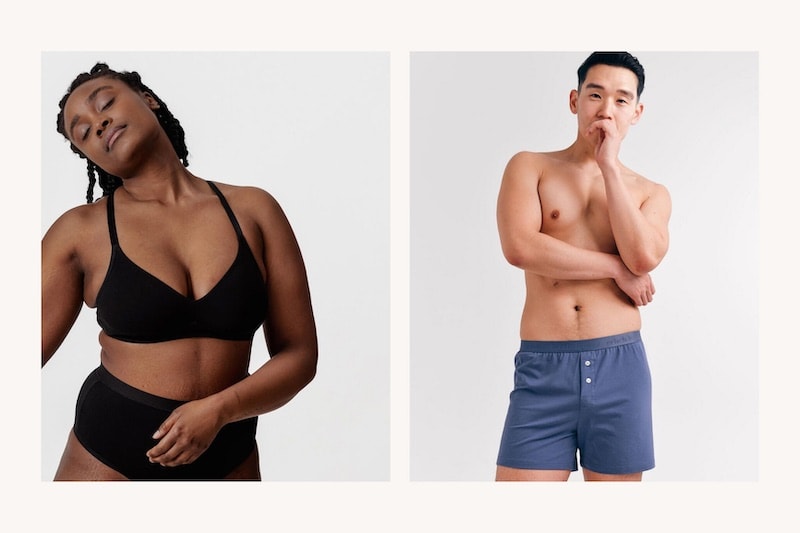
The Knotty Ones - Beste Wahl für Strickwaren
Zertifizierungen: GOTS, Oeko-Tex Standard, Responsible Wool Standard
Natürliche Materialien: Bambus, Bio-Baumwolle, Merinowolle, Seide/Mohair, Wolle/Kaschmir, Wolle/Alpaka
Größenbereich: XS - XL
Preisbereich: €69 - €539
Warum ich es mag: The Knotty Ones beweist, dass grobe Strickwaren gleichzeitig schick und schadstofffrei sein können. Sie verwenden nur natürliche, nachhaltig gewonnene Garne - wie Bio-Baumwolle und Responsible Wool Standard Merino - gefärbt mit schonenden Farbstoffen oder ungefärbt. Die Designs sind minimalistisch und zeitlos (denk an gemütliche Fischer-Pullover und elegante gerippte Cardigans). Das Beste: Jedes Stück wird von weiblichen Kunsthandwerkerinnen im ländlichen Litauen handgestrickt, was Arbeitsplätze und wirtschaftliche Eigenständigkeit schafft. Du kannst sogar die Strickerin, die deinen Pullover gemacht hat, auf ihrer Website "kennenlernen". Das ist ethische, giftfreie Mode in ihrer schönsten Form.
Lieblingsstück: Der Bio-Baumwoll-Pullover "Siluetė". Es ist ein grober, leicht oversized Pullover, der sich anfühlt wie eine warme Umarmung. Das Bio-Baumwollgarn ist unglaublich weich und völlig kratzerfreie (keine synthetische Mischung hier!).
Hier bei The Knotty Ones shoppen*
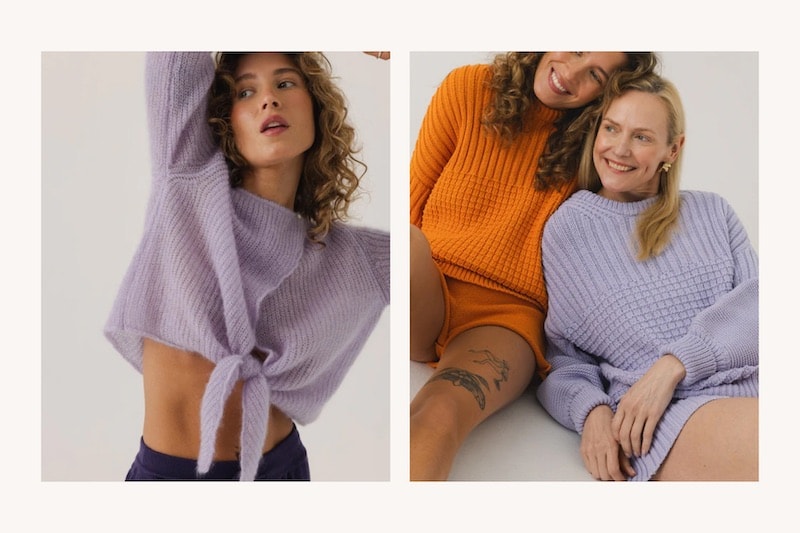
Aikyou* – Minimalistische Unterwäsche für jeden Tag
Zertifizierungen: GOTS, OEKO-TEX Standard 100
Umweltfreundliche Materialien: GOTS-zertifizierte Bio-Baumwolle, geringe Anteile Elasthan
Größenbereich: XS – L
Preisbereich: 28 € – 85 €
Warum ich sie mag: Aikyou steht für minimalistische, aber dennoch raffinierte Unterwäsche, die speziell für kleine Brüste entworfen wurde. Die Designs sind zeitlos und elegant, mit klaren Linien und besonderen Schnitten, die Komfort und Stil perfekt vereinen. Die weiche Bio-Baumwolle ist nicht nur angenehm auf der Haut, sondern auch frei von Schadstoffen und wird nach höchsten ökologischen und sozialen Standards verarbeitet. Aikyou produziert fair in Europa und legt großen Wert auf Transparenz und Nachhaltigkeit – von der Auswahl der Materialien bis zur plastikfreien Verpackung.
Lieblingsstück: Der klassische „BH Lucy" mit feinen Trägern – schlicht, elegant und unglaublich bequem. Ein echtes Wohlfühlteil, das sich perfekt unter jedem Outfit macht.
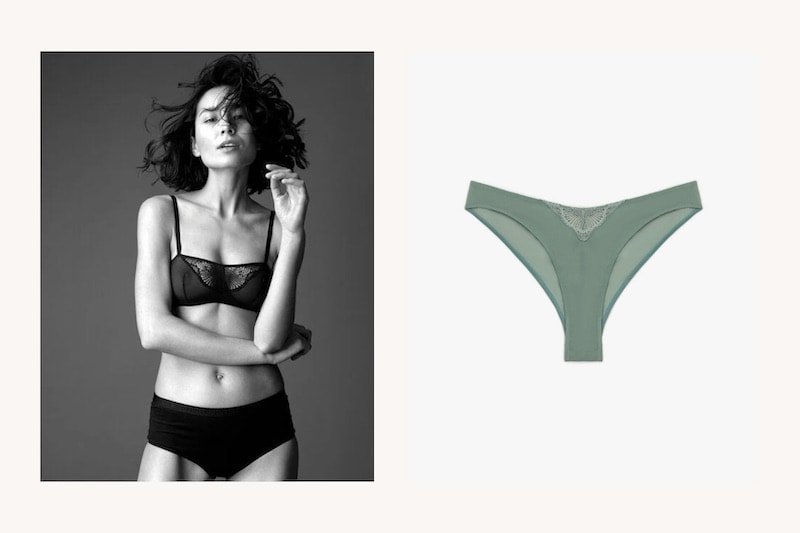
Aya* - Beste plastikfreie nachhaltige Modemarke
Zertifizierungen: GOTS, OEKO-TEX 100, USDA Organic, World Fair Trade Organization
Natürliche Materialien: Bio-Pima-Baumwolle, Elastikbänder (50% Baumgummi und 50% Baumwolle)
Größenbereich: XS - XXL
Preisbereich: 22.30 € - 239.40 €
Warum ich es mag: AYA hat sich zum Ziel gesetzt, Plastik aus der Mode zu eliminieren - und sie haben es geschafft. Diese Marke verwendet natürliche Materialien in jeder Komponente ihrer Kleidung, vom Stoff (superweiche Bio-Pima-Baumwolle) bis zum Nähgarn, den Etiketten und sogar der Dehnung im Bund (die aus einer natürlichen Gummi- und Baumwoll-Elastik-Mischung stammt). Das Ergebnis sind bequeme Basics und Sportkleidung, die null Polyester oder Nylon enthalten und damit wirklich schadstofffrei und sogar biologisch abbaubar sind. AYAs Sortiment besteht hauptsächlich aus Leggings, Tops und Unterwäsche in neutralen Farben.
Lieblingsstück: Die Bio-Baumwoll-Leggings. Das sind vielleicht die einzigen Leggings, die ich je getragen habe, die 100% plastikfrei sind. Sie sind dick genug, um nicht durchsichtig zu sein, mit einer bequemen High-Rise-Passform.
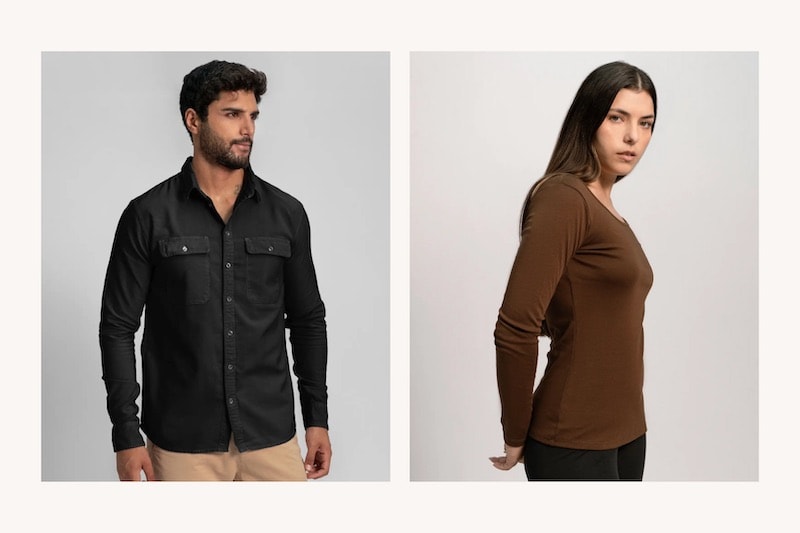
MELA* – Nachhaltige Fair-Fashion für jeden Tag
Zertifizierungen: GOTS, Fairtrade Cotton Standard, Grüner Knopf
Umweltfreundliche Materialien: 100% Bio-Baumwolle (GOTS-zertifiziert), keine Kunst- oder Mischfasern
Größenbereich: XS – XL
Preisbereich: ca. 7.90 € – 119.80 €
Warum ich sie mag: MELA steht für bezahlbare, nachhaltige Mode aus 100% Bio-Baumwolle, die fair und ökologisch in Indien produziert wird. Die Marke ist mehrfach zertifiziert (GOTS, Fairtrade, Grüner Knopf) und verzichtet konsequent auf Schadstoffe und Pestizide. MELA verbindet zeitlose Basics und Essentials mit hoher Qualität und fairem Handel – so wird nachhaltige Fair Fashion für viele Menschen zugänglich. Besonders hervorzuheben ist die transparente Lieferkette und das Engagement für faire Löhne, soziale Arbeitsbedingungen sowie ökologische Standards wie Wassereinsparung und CO₂-Kompensation. Die casual Styles sind bequem, langlebig und perfekt für den Alltag.
Lieblingsstück: Die „RILA“ Shorts mit elastischem Bund aus robustem, nachhaltigem Baumwoll-Ripstop – bequem, stylisch und frei von Schadstoffen.
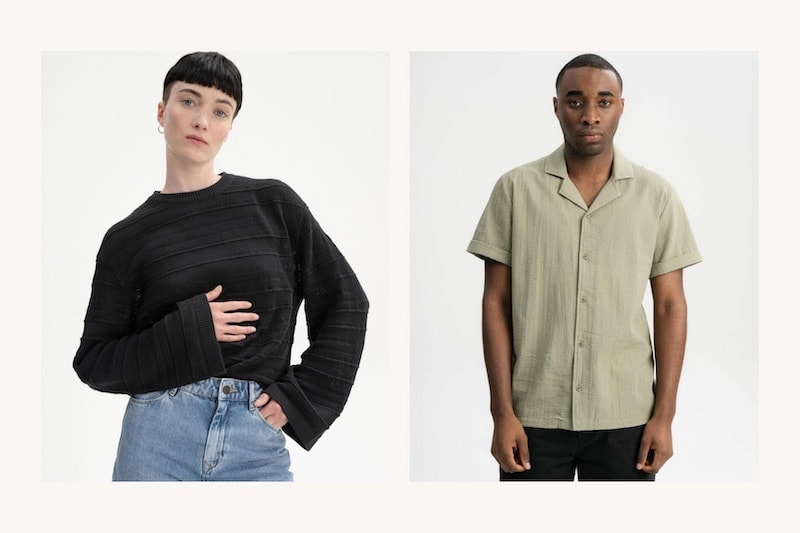
People Wear Organic* – Empfehlung für nachhaltige Baby- und Kinderkleidung
Zertifizierungen: GOTS, Fairtrade Cotton Standard
Schadstofffreie Stoffe: 100% Bio-Baumwolle (GOTS-zertifiziert)
Größenbereich: 50/56 (Neugeborene) – 122/128 (Kinder bis ca. 7 Jahre)
Preisbereich: 7.48 € – 59.95 €
Warum ich sie mag: People Wear Organic macht es Eltern leicht, ihre Kinder mit gutem Gefühl einzukleiden. Die supersoften Teile aus GOTS-zertifizierter Bio-Baumwolle sind wie gemacht für empfindliche Kinderhaut – schadstofffrei, atmungsaktiv und einfach herrlich bequem. Besonders schön: Die liebevoll gestalteten Prints, die praktischen Details wie nickelfreie Druckknöpfe und elastische Bündchen sowie die große Farbauswahl bringen Freude in jeden Kleiderschrank. Fair und transparent produziert, steckt in jedem Stück das gute Gefühl, den Kleinen nur das Beste zu bieten.
Hier bei People Wear Organic shoppen*
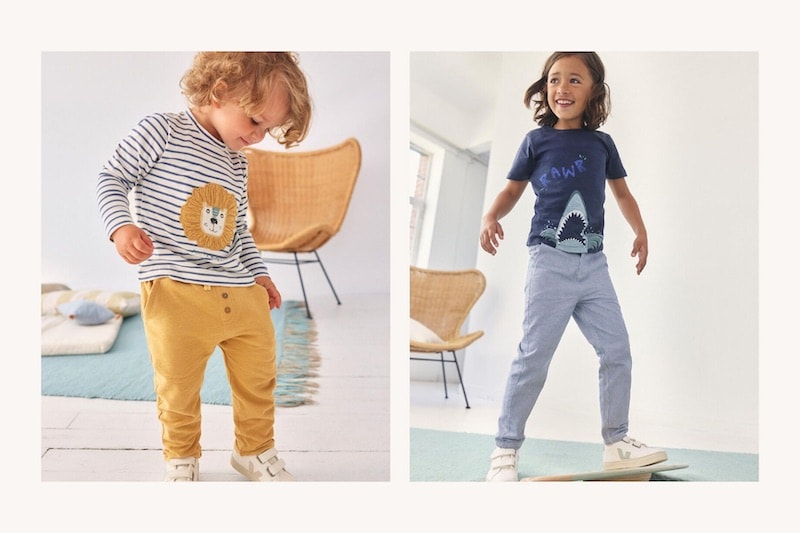
Nachdem du unsere liebsten nachhaltigen Modemarken kennengelernt hast, fragst du dich vielleicht: Was genau vermeiden sie, was herkömmliche Kleidung oft enthält? Im Folgenden erklären wir dir einige der häufigsten giftigen Chemikalien, die in normaler Kleidung lauern - und warum du besser ohne sie dran bist.
Schädliche Chemikalien in herkömmlicher Kleidung
Moderne Kleidung kann ein versteckter Chemikalien-Cocktail sein. Etiketten zeigen nur den Fasergehalt, nicht aber die Behandlungen und Zusatzstoffe auf dem Stoff. Das kann deiner Gesundheit, der Umwelt und den Arbeitskräften in der Produktion schaden. Hier sind einige der häufigsten Giftstoffe, die in alltäglicher Kleidung lauern:
-
Perfluoralkyl- und Polyfluoralkylsubstanzen (PFAS): Diese Chemikalienklasse wird auf "fleckenresistente", "feuchtigkeitsableitende" und "wasserabweisende" Kleidung aufgetragen. PFAS sind auch als "Ewigkeits-Chemikalien" bekannt und werden mit Hormonstörungen und bestimmten Krebsarten in Verbindung gebracht.
-
Flüchtige organische Verbindungen (VOCs): Werden von Farbstoffen und synthetischer Kleidung abgegeben. Das Einatmen von VOCs kann Augen, Nase und Rachen reizen.
-
Formaldehyd: Dieses bekannte Karzinogen wird für Knitterresistenz verwendet. Formaldehyd-Belastung durch Kleidung kann allergische und irritative Kontaktdermatitis verursachen.
-
Phthalate: Werden als Weichmacher verwendet, um Bilder auf Kleidungsstücke zu drucken. Diese Chemikalien sind Hormonstörer und können Hautreizungen und Fortpflanzungsschäden verursachen.
-
Schwermetalle: Blei und Chrom sind häufig in leuchtend gefärbten Stoffen zu finden. Diese Schwermetalle sind hochgiftig, verursachen Hautreizungen und erhöhen langfristig das Krebsrisiko.
-
Chlorbleiche: Wird verwendet, um Flecken zu entfernen und Stoffe zu bleichen. Sie kann deine Haut reizen oder Atemprobleme verursachen.
-
AZO-Farbstoffe: Sie machen 60-70% aller Stofffarben aus, die in der Modeindustrie verwendet werden. Azofarbstoffe können sich in aromatische Amine zersetzen, von denen einige krebserregend sind.
-
Pestizide: Der konventionelle Baumwollanbau verwendet viele Agrochemikalien - tatsächlich macht Baumwolle 16% des weltweiten Insektizideinsatzes und 6% aller Pestizide aus, obwohl sie nur etwa 2,5% der landwirtschaftlichen Fläche einnimmt. Langfristige Pestizidbelastung wird mit Hormonstörungen, Fruchtbarkeitsproblemen und sogar neurologischen Entwicklungsstörungen in Verbindung gebracht.
-
Flammschutzmittel: Um Entflammbarkeitsvorschriften zu erfüllen, besonders bei Kinderschlafanzügen und einigen Polstermöbeln, werden Stoffe mit flammhemmenden Chemikalien (wie bromierte oder phosphorbasierte Verbindungen) behandelt. Viele davon sind inzwischen als giftig bekannt. Studien haben gezeigt, dass Kinder, die bestimmten Flammschutzmitteln im Mutterleib oder als Säuglinge ausgesetzt waren, später Entwicklungsverzögerungen und niedrigere IQ-Werte aufwiesen.
-
Bisphenol A (BPA): Bekannt als Plastikhärter in Flaschen und Dosen, wurde BPA auch in Polyester- und Polyamid-Kleidung gefunden, besonders in Sportkleidung aus recyceltem Plastik. BPA kann als Verarbeitungshilfsmittel oder Farbfixierer verwendet werden. Es ist ein starker Hormonstörer, der mit Entwicklungs- und Fortpflanzungsschäden in Verbindung gebracht wird.
Diese Liste möglicher Giftstoffe kann überwältigend wirken - aber sie verstärkt, warum die Entscheidung für schadstofffreie Kleidung so wichtig ist. Wenn du dich für Bio und nachhaltige Marken entscheidest, vermeidest du automatisch die meisten dieser Schadstoffe. Als Nächstes teilen wir einige Tipps, wie du erkennst, ob Kleidung giftig ist und worauf du beim Einkauf sichererer Kleidung achten solltest.
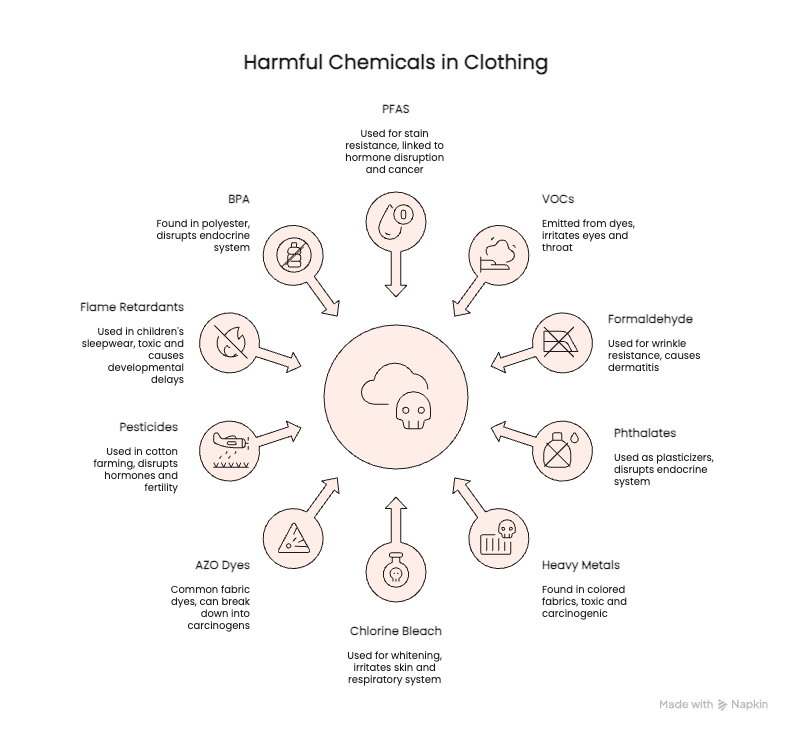
Welche schadstofffreien Kleidungsmaterialien enthalten keine PFAS?
Um PFAS und andere Giftstoffe zu vermeiden, wähle Kleidungsstücke aus natürlichen, unbehandelten Fasern:
-
Bio-Baumwolle: Angebaut ohne synthetische Pestizide oder Düngemittel und verarbeitet ohne aggressive Chemikalien wie Chlorbleiche oder Formaldehyd. Bio-Baumwolle ist atmungsaktiv, hypoallergen und sanft zur Haut.
-
Leinen: Hergestellt aus der Flachspflanze, die sehr wenig Pestizide oder Bewässerung benötigt. Leinenfasern sind von Natur aus antibakteriell und hoch atmungsaktiv, was sie zu einer großartigen schadstofffreien Wahl für warmes Wetter macht.
-
Hanf: Eine extrem umweltfreundliche Faser, die schnell ohne synthetische Düngemittel oder Pestizide wächst. Hanf-Stoffe sind langlebig und atmungsaktiv und benötigen keine chemischen Behandlungen, um stark zu sein (sie werden tatsächlich mit jeder Wäsche weicher).
-
Bambus (Viskose/Rayon): Wenn in einem geschlossenen Kreislauf oder mechanischen System verarbeitet, kann Bambus einen weichen Stoff ohne giftige Rückstände ergeben. Achte auf OEKO-TEX® zertifizierte Bambus-Viskose, um sicherzustellen, dass sie sicher hergestellt wurde.
-
TENCEL™ Lyocell: Eine Marken-Lyocellfaser aus Holzzellstoff in einem ungiftigen Lösungsmittelsystem. Tencel ist luxuriös weich, feuchtigkeitsableitend und wird mit minimaler Umweltbelastung produziert.
-
Wolle: Eine natürliche Tierfaser, die keine chemische Verarbeitung benötigt, um funktional zu sein. Unbehandelte Wolle reguliert die Temperatur und ist antimikrobiell. Achte nur darauf, dass sie nicht mit Mottenschutzmitteln behandelt ist; ansonsten ist Wolle generell eine sichere, schadstofffreie Option.
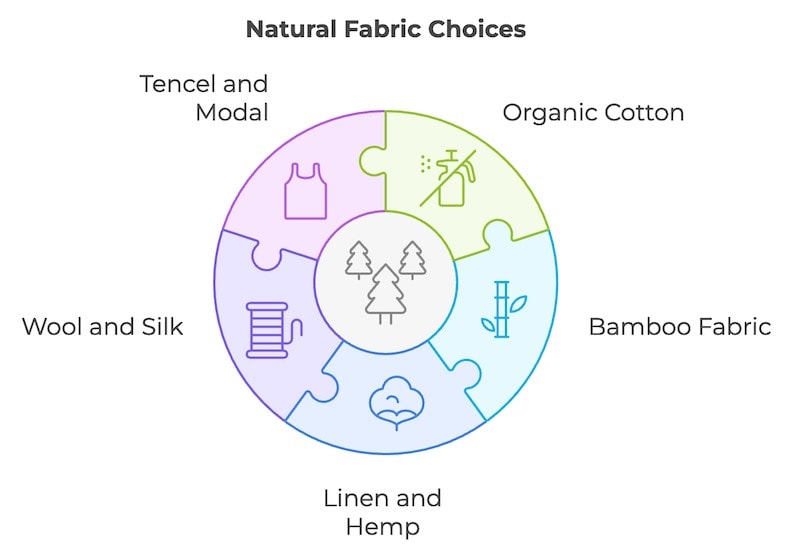
Wie erkenne ich, ob meine Kleidung Schadtsoffe enthält?
Nicht sicher, ob dein neues Outfit schädliche Chemikalien versteckt? Nutze diese Tipps, um potenziell giftige Kleidung zu entlarven, bevor du sie kaufst oder trägst:
-
Lies die Etiketten: Schau über Größe und Style hinaus - lies das Materialetikett und alle Beschreibungen von Veredelungen. Falls du Begriffe wie "knitterfrei", "bügelfrei", "fleckenresistent" oder "antimikrobiell" siehst, sei vorsichtig: Diese deuten oft auf chemische Behandlungen hin (wie Formaldehyd für Knitterresistenz, PFAS für Fleckenabweisung oder antibakterielle Wirkstoffe wie Triclosan).
-
Mach den Geruchstest: Riech einmal an dem Kleidungsstück. Wenn es einen starken chemischen Geruch hat (wie einen scharfen oder sauren Geruch), ist das ein Warnsignal. Ein starker Chemikaliengeruch könnte Rückstände von Formaldehyd, Lösungsmitteln oder Aceton aus Veredelungen und Drucken bedeuten.
-
Fühl den Stoff: Berührung kann ein Hinweis sein. Fühlt sich der Stoff unnatürlich glatt, steif oder wachsartig an? Ein glitschiges oder filmartiges Gefühl könnte auf eine PFAS-Beschichtung hindeuten (häufig bei Regenbekleidung oder Performance-Leggings). Reibe auch den Stoff zwischen deinen Fingern - falls er einen seltsamen Geruch oder Rückstände hinterlässt, ist das ein schlechtes Zeichen.
-
Achte auf Zertifizierungen: Im Zweifelsfall vertraue auf unabhängige Zertifizierungen auf der Kleidung oder Verpackung. Siegel wie GOTS (für Bio-Fasern und sichere Verarbeitung) oder OEKO-TEX® Standard 100 (getestet auf schädliche Chemikalien) geben dir die Gewissheit, dass das Kleidungsstück strenge Sicherheitskriterien erfüllt.
-
Wasch vor dem ersten Tragen: Falls du vermutest, dass ein Kleidungsstück Veredelungschemikalien haben könnte (oder auch wenn nicht), ist es eine gute Gewohnheit, Kleidung vor dem Tragen zu waschen. Eine kalte oder warme Wäsche mit einem sanften Waschmittel kann viele Oberflächenchemikalien wie überschüssige Farbstoffe, Formaldehyd und Verarbeitungsrückstände entfernen (du wirst oft sehen, wie dieser gelbliche Schimmer aus neuer Kleidung herausgewaschen wird - das ist Formaldehyd).
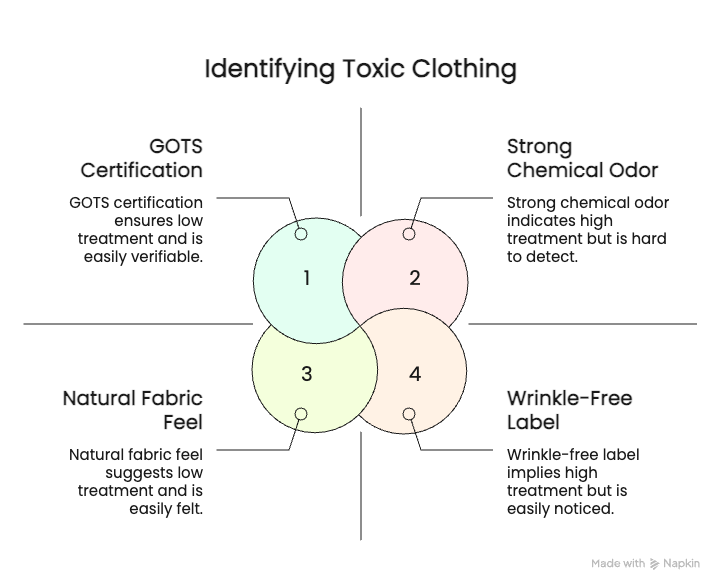
Worauf du bei schadstofffreien nachhaltigen Modemarken achten solltest
Um sicherzustellen, dass deine Kleidung wirklich schadstofffrei ist, behalte diese Tipps im Kopf:
-
Natürliche Fasern: Bevorzuge Optionen aus natürlichen Materialien wie Bio-Baumwolle, Leinen, Bambus-Lyocell, Hanf oder TENCEL™.
-
Schadstofffreie Farbstoffe: Achte auf Azo-freie, GOTS-zugelassene, OEKO-TEX-zugelassene oder pflanzenbasierte Farbstoffe. Vermeide außerdem strahlend weiße Farben bei natürlichen Materialien wie Baumwolle oder Hanf, da dies bedeuten könnte, dass sie mit aggressiven Chemikalien oder Bleichmitteln behandelt wurden.
-
Zertifizierungen: Stelle sicher, dass die Marke ihre Behauptungen mit vertrauenswürdigen Nachhaltigkeitszertifizierungen von Drittanbietern untermauert, Global Organic Textile Standard (GOTS) und OEKO-TEX.
-
Ethische Beschaffung: Unterstütze Marken mit transparenten Lieferketten und fairen Arbeitsbedingungen.
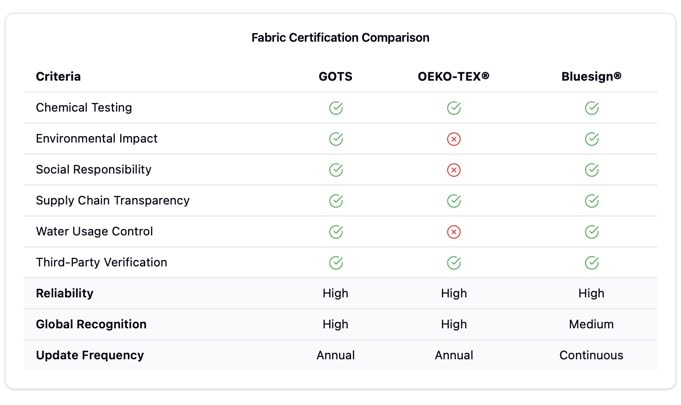
Die wichtigsten Erkenntnisse
-
Deine Kleidung kann ein Chemikalien-Cocktail sein. Herkömmliche Kleidungsstücke enthalten oft PFAS, Formaldehyd, BPA, Azofarbstoffe und Schwermetall-Pigmente, die mit Hormonstörungen, Fruchtbarkeitsproblemen, Krebs und Hautreizungen in Verbindung gebracht werden.
-
Die Haut nimmt wirklich auf, was du trägst. Neueste Laboruntersuchungen zeigen, dass bis zu 60% bestimmter PFAS-Beschichtungen in nur 36 Stunden in die menschliche Haut eindringen können - Kinder sind besonders gefährdet, weil ihre Haut dünner ist.
-
Natürliche, zertifizierte Fasern sind die sicherste Wahl. GOTS-zertifizierte Bio-Baumwolle, Hanf, Leinen, TENCEL™ Lyocell und unbehandelte Wolle werden ohne giftige Pestizide oder Veredelungen produziert und geben keine Mikroplastik ab.
-
Siegel von Drittanbietern sind wichtig. Achte auf GOTS, OEKO-TEX 100, bluesign® oder MADE SAFE Labels, um zu bestätigen, dass Materialien und Farbstoffe unabhängig auf schädliche Substanzen getestet wurden.
-
Fang mit den wichtigsten Austauschaktionen an. Ersetze zuerst hautnahe Kleidung - Unterwäsche, Sport-BHs, Leggings und Kinderkleidung - und arbeite dich dann zu den äußeren Schichten vor, um den größten Gesundheitsnutzen zu erzielen.
FAQ zu schadstofffreien nachhaltige Modemarken
Welcher schadstofffreie Stoff ist am besten zum Tragen?
Natürliche Bio-Fasern sind generell die beste Wahl. Bio-Baumwolle gilt oft als Goldstandard für schadstofffreie Materialien - sie wird ohne schädliche Pestizide angebaut und ohne Chlorbleiche oder Formaldehyd verarbeitet, sodass der fertige Stoff sehr rein ist. Andere großartige schadstofffreie Stoffe sind Hanf (benötigt keine Pestizide und minimale Verarbeitung), Leinen (Flachsfasern brauchen sehr wenig chemische Eingriffe) und TENCEL™ Lyocell (hergestellt in einem geschlossenen Kreislaufverfahren ohne giftige Lösungsmittel). Merinowolle ist eine weitere sichere Option, solange sie nicht mit Mottenschutz- oder Einlaufschutz-Chemikalien behandelt wurde.
Ist Baumwoll-Kleidung schadstofffrei?
Herkömmliche Baumwoll-Kleidung kann Giftstoffe enthalten, aber Bio-Baumwoll-Kleidung ist schadstofffrei. Die Baumwollfaser selbst ist natürlich, aber entscheidend ist, wie sie angebaut und verarbeitet wird. Normale Baumwolle ist eine der chemikalienintensivsten Kulturen - sie kann Pestizidrückstände enthalten und mit Chlorbleiche, Formaldehyd (für Knitterresistenz) oder Farbstoffen mit Schwermetallen behandelt werden. Im Gegensatz dazu wird Bio-Baumwolle ohne synthetische Pestizide angebaut und nach strengen Standards verarbeitet (bei GOTS-Zertifizierung werden zum Beispiel kein Formaldehyd oder giftige Farbstoffe verwendet).
Welche Kleidung enthält kein Mikroplastik?
Kleidung, die vollständig aus natürlichen Fasern besteht, enthält kein Mikroplastik. Mikroplastik-Fasern stammen aus synthetischen Materialien wie Polyester, Nylon, Acryl und Elasthan. Ein 100% Baumwoll-T-Shirt oder eine Leinenhose beispielsweise sind biologisch abbaubar und geben kein Plastik ab.
Hier sind 3 zusätzliche FAQ-Fragen, die gut zu den bestehenden passen und sich nicht überschneiden:
Welche Marken sind bekannt für nachhaltige Mode?
Zu den bekanntesten nachhaltigen Modemarken gehören Armedangels, LANIUS, Jan & June und Living Crafts aus Deutschland, sowie internationale Labels wie Organic Basics, Outerknown und Jungmaven. Diese Marken zeichnen sich durch GOTS-zertifizierte Bio-Materialien, faire Produktionsbedingungen und transparente Lieferketten aus. Viele dieser Labels sind auch B Corp-zertifiziert oder arbeiten mit Fair Trade-Standards, was ihre Glaubwürdigkeit im Bereich Nachhaltigkeit unterstreicht.
Welche natürlichen Stoffe gibt es?
Die wichtigsten natürlichen Stoffe für schadstofffreie Kleidung sind Bio-Baumwolle, Leinen (aus Flachs), Hanf, Seide, Wolle (Merino, Alpaka, Kaschmir) und moderne Fasern wie TENCEL™ Lyocell und Modal aus nachhaltig gewonnenem Holzzellstoff. Bambus-Viskose ist ebenfalls eine natürliche Option, sollte aber OEKO-TEX-zertifiziert sein. Diese Materialien sind biologisch abbaubar, geben kein Mikroplastik ab und werden ohne synthetische Chemikalien hergestellt - vorausgesetzt, sie stammen aus biologischem Anbau oder nachhaltiger Produktion.
Welche Marken machen Slow Fashion?
Slow Fashion-Marken setzen auf Qualität statt Quantität und produzieren zeitlose, langlebige Kleidung. Dazu gehören The Knotty Ones (handgestrickte Pullover), LANIUS (feminine, zeitlose Schnitte), Armedangels (klassische Basics), erlich textil (nachhaltige Unterwäsche) und MELA (faire Basics). Diese Labels bringen weniger, aber dafür durchdachte Kollektionen heraus, verwenden hochwertige Materialien und setzen auf faire Produktionsbedingungen. Der Fokus liegt auf langlebigen Lieblingsstücken, die über Jahre getragen werden können.













